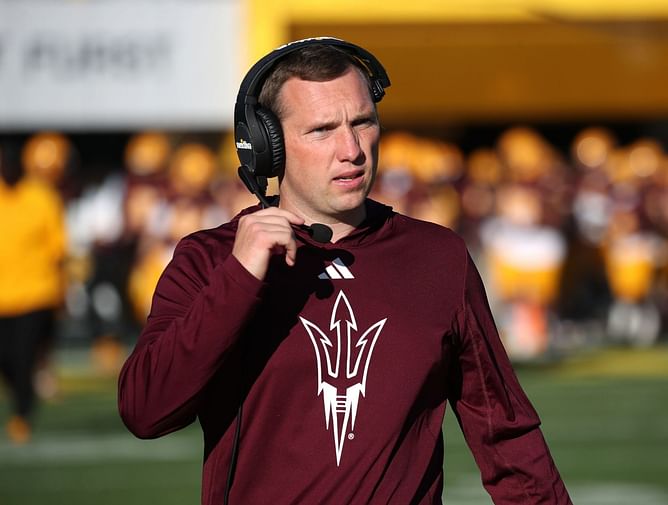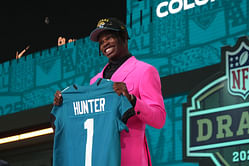Team Information
| Ground | Arizona Stadium |
| City | Tucson, Arizona |
| Conference | Big 12, |
| Nickname | Wildcats |
About Arizona Wildcats Football
Nestled in the picturesque landscapes of the southwestern United States, the Arizona Wildcats Football program represents a compelling blend of tradition, passion, and gridiron excellence. With a history dating back to the early 20th century, the Arizona Wildcats Football team has left an indelible mark on the world of sports.
The Wildcats call the Arizona Stadium in Tucson their home, a venue where the crowd's roar and the competition's intensity converge to create an electrifying atmosphere on game days. The Arizona Wildcats Football legacy is deeply intertwined with the Pac-12 Conference, where they have fiercely battled some of the nation's most formidable opponents, etching their name in the annals of college football history.
| Name of Team | Arizona Wildcats Football |
| First season | 1899 |
| Athletic director | Dave Heeke |
| Head coach | Jedd Fisch (as of September 2021) |
| Stadium | Arizona Stadium |
| Location | Tucson, Arizona |
| Conference | Pac-12 |
| Division | South |
| Field surface | Natural Grass |
| Conference titles | 1 |
| Division titles | 0 |
| Fight Song | "Bear Down, Arizona!" |
| Mascot | Wilbur the Wildcat |
| Rivals | Arizona State Sun Devils, UCLA Bruins, and others |
| Consensus All-Americans | Numerous over the years |
Arizona Wildcats Football isn't just about wins and losses; it's about a commitment to excellence, a relentless pursuit of greatness, and the unwavering support of a passionate fan base. The Arizona Wildcats Football team's rich tradition includes producing top-tier NFL talent and showcasing the talent development prowess of the program.
As we delve deeper into the world of Arizona Wildcats Football, we'll uncover the triumphs, challenges, and remarkable stories that have defined this program. From legendary coaches to iconic players, this tale is about resilience, dedication, and a profound love for the game. Join us on a journey through the heart and soul of Wildcats football as we explore its enduring impact on the landscape of college athletics.
Arizona Wildcats History
The history of Arizona Wildcats Football is a tapestry of triumphs, challenges, and unwavering dedication. Dating back to its inaugural season in 1899, the Wildcats have left an indelible mark on college football. Over the years, they have competed fiercely in the Pac-12 Conference, showcasing their resilience and commitment to excellence.
One standout achievement in the program's history is their conference title, a testament to their ability to rise to the occasion. While they haven't clinched a division title, their relentless pursuit of greatness drives the team forward.
The Wildcats' home, Arizona Stadium in Tucson, reverberates with the echoes of passionate fans and the cheers of supporters. Their fight song, "Bear Down, Arizona!" is a rallying cry that unites the Wildcat faithful.
Arizona Wildcats Football has produced numerous Consensus All-Americans throughout the decades and contributed significantly to the NFL talent pool. The program's legacy is not just in its victories but in the enduring spirit and love for the game that it instills in its players and fans alike.
Arizona Wildcats Coach
The Arizona Wildcats Football team was led by head coach Jedd Fisch. Fisch brought his experience and enthusiasm to the program, aiming to rejuvenate it.
Since the team's inception in 1899, the Wildcats have seen several head coaches guiding them through the ups and downs of college football. The exact number of coaches can vary depending on the timeframe, as coaching tenures change over the years due to various factors. These coaches have contributed to the program's rich history, leaving their unique marks on the Arizona Wildcats Football legacy.
| Tenure | Coach Name |
| 1899-1900 | William W. Skinner |
| 1901 | No Team |
| 1902 | William W. Skinner |
| 1903-1906 | George Schaeffer |
| 1907-1909 | Fred M. Murphy |
| 1910-1914 | James A. Whipple |
| 1915 | No Team |
| 1916-1917 | Pop McKale |
| 1918 | No Team (World War I) |
| 1919-1930 | Pop McKale |
| 1931-1935 | Michael C. Casteel |
| 1936-1950 | Robert Winslow |
| 1951-1956 | Warren Woodson |
| 1957-1958 | Ed Doherty |
| 1959-1975 | Darrell Mudra |
| 1976-1977 | Tony Mason |
| 1978-1986 | Larry Smith |
| 1987-2000 | Dick Tomey |
| 2001-2003 | John Mackovic |
| 2003 (interim) | Mike Hankwitz |
| 2004-2011 | Mike Stoops |
| 2011 (interim) | Tim Kish |
| 2012-2017 | Rich Rodriguez |
| 2018 (interim) | Marcel Yates |
| 2019-2020 | Kevin Sumlin |
| 2021-present | Jedd Fisch |
Arizona Wildcats Stadium: Wildcats Stadium
Arizona Stadium, affectionately known as "Wildcats Stadium," is the spirited home of the Arizona Wildcats football team. Nestled in Tucson, this iconic venue accommodates over 50,000 enthusiastic fans who gather to witness thrilling college football action. Framed by the picturesque Santa Catalina Mountains, the stadium's natural grass field adds to its charm. It's a place where the Wildcats' fight song echoes, tradition meets passion and unforgettable football moments unfold, making Arizona Stadium a beloved cornerstone of the Wildcats' legacy.
Arizona Wildcats Rivels
The Arizona Wildcats have a storied history of intense rivalries that have defined their football program for decades. Chief among these rivalries is the fierce feud with the Arizona State Sun Devils, known as the "Territorial Cup." This in-state showdown transcends the football field, sparking spirited debates and deep-rooted animosity among fans and players alike. The annual clash for the Territorial Cup is a battle for state supremacy, where bragging rights are fiercely contested.
Beyond the border battles with Arizona State, the Wildcats have other notable rivalries within the Pac-12 Conference. The matchup against the UCLA Bruins, often called the "Desert Storm," is another fiercely contested contest. The rivalry with the USC Trojans also adds to the Wildcats' competitive history.
These rivalries are more than just games; they're traditions that unite fans in unwavering support of their team. The anticipation of these matchups creates an electric atmosphere, with emotions running high on both sides of the field.
Over the years, these rivalries have produced iconic moments, memorable victories, and heartbreaking defeats, further cementing their significance in the world of college football. They are a testament to the passion and pride that the Arizona Wildcats and their fans bring to the gridiron, making every showdown a spectacle that transcends the game itself.
The Copper Bowl
The Copper Bowl, also known as the Arizona Copper Bowl, was an iconic post-season college football game that hosted exhilarating matchups involving the Arizona Wildcats football team. This thrilling event, held annually from 1989 to 1999, showcased the Wildcats against formidable opponents. Teams from various conferences competed in Tucson, Arizona, to pursue the coveted Copper Bowl trophy. The Copper Bowl provided a platform for the Wildcats to shine on their home turf and became a beloved tradition for fans, marking memorable moments in the program's history. It was a testament to Arizona's football prowess and place in college football lore.
| No | Year | Location | Opposing Team | Winner | Score |
| 1. | 1989 | Tucson, AZ | North Carolina | Arizona | 17 - 10 |
| 2. | 1990 | Tucson, AZ | NC State | NC State | 31 - 27 |
| 3. | 1991 | Tucson, AZ | Indiana | Arizona | 24 - 14 |
| 4. | 1992 | Tucson, AZ | Baylor | Baylor | 20 - 15 |
| 5. | 1993 | Tucson, AZ | Kansas State | Kansas St. | 52 - 17 |
| 6. | 1994 | Tucson, AZ | Utah | Arizona | 29 - 0 |
| 7. | 1995 | Tucson, AZ | Colorado State | Colorado St. | 35 - 21 |
| 8. | 1996 | Tucson, AZ | BYU | BYU | 19 - 16 |
| 9. | 1997 | Tucson, AZ | New Mexico | Arizona | 20 - 14 |
| 10. | 1998 | Tucson, AZ | Oklahoma | Oklahoma | 38 - 3 |
| 11. | 1999 | Tucson, AZ | Missouri | Arizona | 60 - 52 |
Arizona Wildcats football Record and stats
The Arizona Wildcats football program boasts a rich and diverse history, with a notable win-loss record showcasing their competitive spirit. While the exact figures may evolve from season to season, as of my last knowledge update in September 2021, the Wildcats had secured approximately 635 wins and faced 488 losses. This record reflects their enduring presence in the collegiate football landscape.
Beyond their overall record, Arizona has made numerous appearances in prestigious bowl games and clinched conference titles, most recently in 1993. The program has been a talent factory, producing consensus All-American players and NFL stars, such as Tedy Bruschi, Rob Gronkowski, and Lance Briggs.
Arizona Wildcats football is a testament to the enduring passion for the game and the commitment to excellence that defines collegiate sports. Their history, filled with memorable moments and accomplished athletes, remains integral to the college football legacy.
Conference Titles
| Year | Conference | Coach | Overall Record | Conference Record |
| 1933 | Border Conference | Pop McKale | 7-2-1 | 3-0-1 |
| 1934 | Border Conference | Pop McKale | 8-1 | 4-0 |
| 1941 | Border Conference | Mike Casteel | 6-2-2 | 4-0-1 |
| 1964 | Western Athletic | Jim LaRue | 8-1-1 | 5-0-1 |
| 1973 | Western Athletic | Jim Young | 9-2 | 6-0 |
| 1993 | Pac-10 | Dick Tomey | 10-2 | 6-1 |
Conference Championship Game Appearances
| Year | Conference | Opponent | Championship Game Results |
| 1993 | Pac-10 | UCLA Bruins | Arizona 32 - UCLA 25 |
| 2014 | Pac-12 | Oregon Ducks | Oregon 51 - Arizona 13 |
| 2022 | Pac-12 | Utah Utes | Pending Result |
Arizona Wildcats Rosters
The Arizona Wildcats football team continually assembles a diverse and talented roster of athletes, showcasing a mix of seasoned veterans and promising newcomers. The coaching staff meticulously crafts these rosters to ensure a competitive edge in the challenging world of college football. They represent a blend of raw athleticism, dedication, and a commitment to excellence on and off the field.
Rosters typically comprise quarterbacks, running backs, wide receivers, offensive and defensive linemen, linebackers, and defensive backs, among other positions. Each player brings their unique skills and strengths to the team, contributing to the Wildcats' overall strategy.
The composition of the roster evolves from season to season, influenced by recruiting efforts, transfers, and player development. These rosters serve as a testament to the dynamic nature of college football, where fresh talent continually emerges to make its mark and carry the legacy of the Arizona Wildcats forward.
Arizona Wildcats Schedule
The Arizona Wildcats football schedule is a meticulously crafted roadmap that outlines their journey through the competitive landscape of college football. It's a mix of anticipation, strategy, and preparation that fans eagerly follow each season. The schedule is a tapestry of games, both home and away, that test the Wildcats' mettle against formidable opponents.
Non-conference matchups offer a chance to gauge their abilities against a diverse array of teams, while conference games are the battlegrounds where rivalries ignite and championships are pursued. The schedule is a reflection of the team's aspirations and the dedication of coaches and players who spend countless hours preparing for each contest.
Tailored to the ebb and flow of the college football season, the schedule culminates in bowl game appearances, offering the Wildcats an opportunity to shine on a national stage. It's a journey filled with highs and lows, but it's the collective effort and determination that define the Arizona Wildcats football schedule, uniting players, coaches, and fans in pursuit of victory and excellence.
FAQs
A. As of my last update in September 2021, the Wildcats had won the Territorial Cup 52 times in the rivalry's history.
A. Nick Foles holds the record as the all-time leading passer for the Arizona Wildcats, with over 10,000 passing yards during his collegiate career.
A. The Wildcats last appeared in a major bowl game in the 2014 Fiesta Bowl, facing the Boise State Broncos.
A. Yes, the Wildcats have had one Heisman Trophy winner: Terry Baker, who won the award in 1962.
A. Arizona Stadium has a seating capacity of over 50,000, providing a vibrant atmosphere for Wildcats football games.




